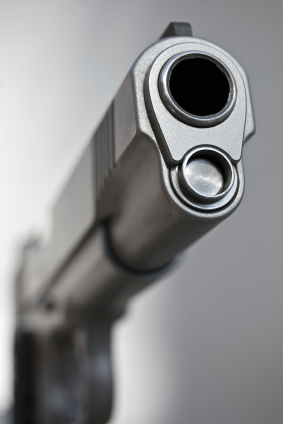
NOTE: This article was updated to reflect 2020 changes in Illinois law with passage of Public Act 101-223. These changes became effective on January 1st, modifying the Illinois laws against and penalties for unlawful use of weapons at places of worship.
In one decision, the Illinois Supreme Court has undone thousands of convictions for carrying a loaded firearm and opened the door for the release of hundreds of inmates in prison.
The state high court has ruled that the aggravated unlawful use of a weapon statute is unconstitutional.
Individuals who were convicted of this crime may have the right to have their convictions set aside and expunged or sealed. Inmates serving a sentence for this crime may be eligible for immediate release.
The Supreme Court decision was issued on September 12, 2013. The high court decided the appeal of People v. Aguilar, and ruled that the statute that criminalizes the carrying of a loaded firearm is a violation of the 2nd Amendment right to bear arms.
In Aguilar, the defendant was arrested by officers from the Chicago Police Department. They said they saw him drop a gun in an alley. The gun had three live rounds of ammunition. He was convicted of two firearms offenses in court: aggravated unlawful use of a weapon, 720 ILCS 5/24-1.6(a)(1), (a)(3)(A), and unlawful possession of a firearm, 720 ILCS 5/24-3.1(a)(1). He was 17 years old at the time of his arrest.
Aggravated Unlawful Use of a Weapon Statute
The statute for aggravated unlawful use of a weapon (AGG UUW) says the following:
A person commits the offense of aggravated unlawful use of a weapon when he or she knowingly carries on or about his or her person or in any vehicle or concealed on or about his or her person except when on his or her land or in his or her abode or fixed place of business any pistol, revolver, stun gun or taser or other firearm. See 720 ILCS 5/24-1.6(a)(1).
And, one of the following factors is present:
The firearm possessed was uncased, loaded and immediately accessible at the time of the offense. See (a)(3)(A).
This is essentially a ban on carrying any ready-to-use firearm. The offense punishable as a Class 4 felony offense (1-3 years incarceration).
The Illinois Supreme Court came into the issue rather late, as a federal court had already ruled the statute was unconstitutional. In Moore v. Madigan, 702 F.3d 933 (7th Cir. 2012), the federal appeals court said the statute violated the Bill of Rights. The federal court said that the statute was “a flat ban on carrying ready-to-use guns outside the home” and as such, it violates the 2nd Amendment right to keep and bear arms.
The Illinois Supreme Court said it agreed with the federal decision, that the 2nd Amendment right to keep and bear arms extends beyond the home. Nonetheless, the high court indicated it would be willing to consider a reasonable regulation:
Of course, in concluding that the second amendment protects the right to possess and use a firearm for self-defense outside the home, we are in no way saying that such a right is unlimited or is not subject to meaningful regulation.
Coming full circle, it seems likely that the 2020 changes to the unlawful use of weapons statute will represent a reasonable regulation in the eyes of the Illinois Supreme Court. More specifically, any person who carries or possesses a firearm in a place of worship – such as a church, synagogue, or mosque – will be guilty of unlawful use of weapons. Moreover, it is now a Class 2 felony to commit unlawful use of weapons at a place of worship, which carries a sentencing range of 3-7 years in a correctional facility.
Returning to the Aguilar decision, the high court reversed the conviction for aggravated unlawful use of a weapon (AGG UUW) but did not reverse the conviction for unlawful possession of a firearm. The court distinguished the issue as one involving limits to the 2nd Amendment:
[W]e need only express our agreement with the obvious and undeniable conclusion that the possession of handguns by minors is conduct that falls outside the scope of the second amendment’s protection.
As said, any person who was convicted of AGG UUW has been given a second chance. And second chances aren’t given often in criminal courts.
This is a momentous decision in Illinois legal history. Click here to download this important 2nd Amendment decision from the Illinois Supreme Court. And if you have legal questions, contact Sami Azhari to get answers and start planning your defense.

